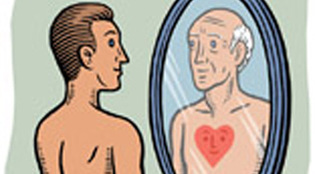 loading
loading
FindingsYour heart is only as old as you feel Gregory NemecView full imageYoung people who think of the elderly as feeble, helpless, or otherwise impaired may be engaging in self-fulfilling prophecy. Becca Levy, an epidemiologist and psychologist at the School of Public Health, and her colleagues have shown that young adults with ageist attitudes can put their own future health at risk. Levy and her team analyzed data originally collected for the Baltimore Longitudinal Study of Aging, a study of more than 400 18- to 49-year-olds. The subjects took a survey in the 1960s about their attitudes toward older people, and they were medically monitored for decades. Levy found that young adults with negative views of older adults were more likely to have cardiovascular problems in later life. "The negative stereotypes were associated with higher risk," Levy says, even after she and her team adjusted for gender, body mass index, family history, and other factors. When they looked at just the younger subjects -- those who had been 39 or under at the time of the initial survey -- the effect was even stronger; participants with negative stereotypes were twice as likely to suffer from strokes, heart attacks, and other problems after their 60th birthdays than those with more positive views. (The study was published in the March issue of Psychological Science.) The findings suggest that people internalize their attitudes toward the elderly at an early age, though the specific mechanism behind the effect on heart health remains unclear. "We're really interested in finding out the specifics of how these effects occur," says Levy. "I'm also interested in thinking about how to overcome some of these negative stereotypes." So far, studies reveal that most people's attitudes toward the elderly are remarkably consistent across their life spans, but it's possible that changing the attitudes of the young, Levy says, could pay dividends for their health later in life.
The comment period has expired.
|
|